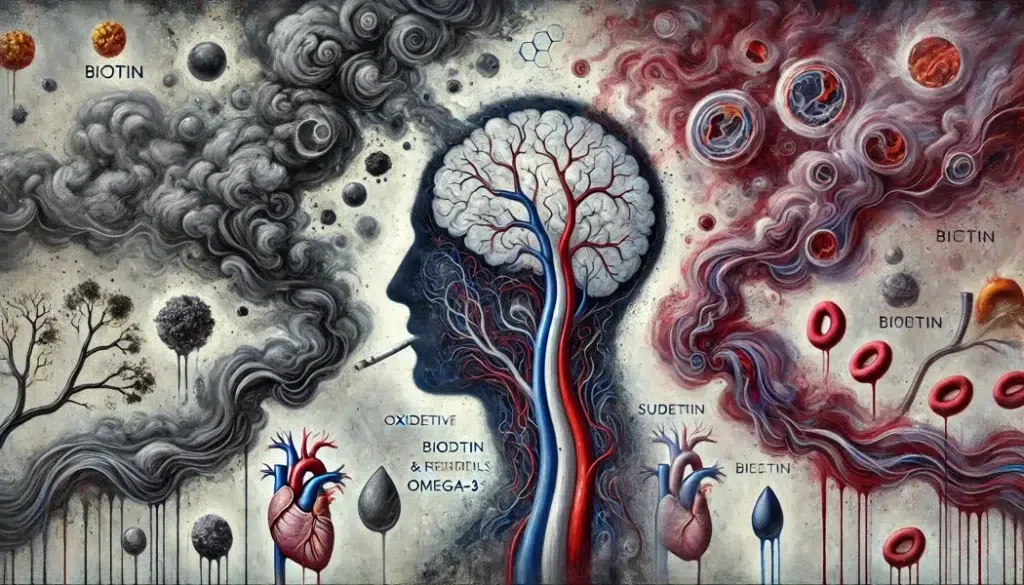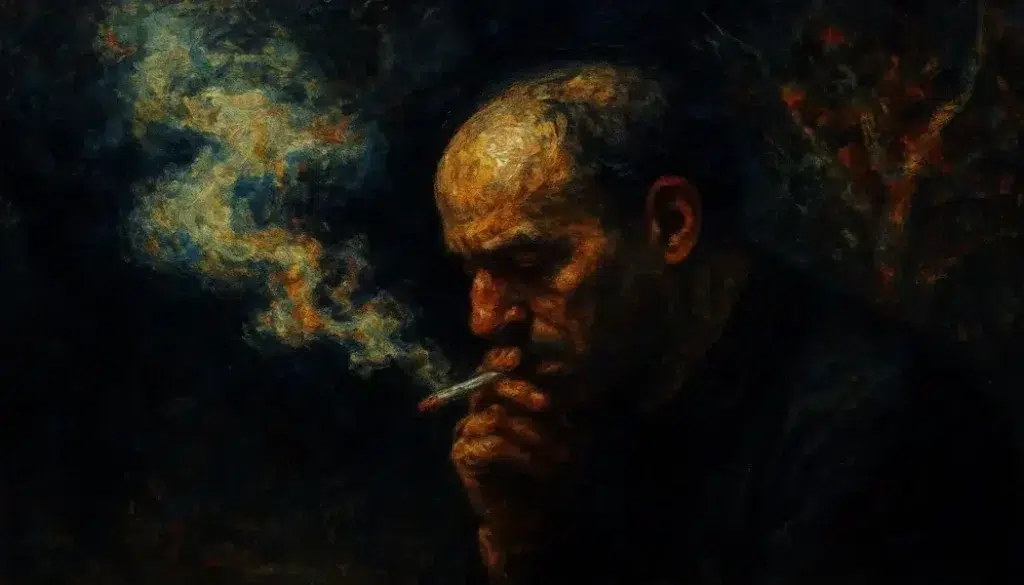Smoking’s impact on health is a well-trodden path, but the way it hits our hair is sometimes overlooked. Hair isn’t just about looks; for many guys, it’s a big part of personal confidence. Knowing how smoking can mess with hair helps frame a bigger picture of health.
Studies reveal a pretty surprising connection between puffing away and less-than-stellar hair health. Smokers are more likely to experience hair thinning and even hair loss. It’s not just random bad luck but a combination of factors working together to disrupt those precious strands.
Understanding how smoking affects hair is crucial. We’re talking about real changes in the scalp’s environment—changes invisible to the eye but clear as day in the lab. From poor circulation to oxidative stress, there’s a cascade of effects that messes with hair growth. This isn’t just trivia; it’s about making informed choices if you’re looking to keep a full head of hair.
🧪 The Scientific Link Between Smoking and Hair Loss
When it comes to smoking and hair loss, science has plenty to say. Various studies report that smokers face higher chances of hair shedding than non-smokers. This isn’t just hearsay—research pinpoints two main culprits: oxidative stress and poor blood circulation.
Oxidative stress (NIH) occurs when there’s an overload of free radicals—those pesky molecules created by smoking—that damage cells, including those in hair follicles. This stress can weaken the hair structure, making it prone to thinning and eventually leading to loss.

But it’s not just about stressed cells. Smoking affects blood flow, too, which is crucial for nourishing hair follicles. Nicotine thickens blood vessels, making it hard for essential nutrients and oxygen to reach the scalp. Over time, follicles might fail to get the nutrients needed to sprout strong, healthy hair.
Connecting these dots helps explain why smokers might find more hair on the pillow or in the shower drain. Being aware of these effects is a step toward understanding the bigger picture and considering healthier choices for your mane. By shining a light on this connection, we get a clearer path on how lifestyle choices directly influence not just our lungs and hearts but our hair as well.
In the meantime, while still smoking or preparing to quit, there are practical steps you can take to support your hair.
Additionally, consider taking dietary supplements that target hair strength and growth. Biotin, zinc, and omega-3 fatty acids are known to support follicle health and improve scalp conditions from the inside out. While they won’t completely undo the damage.
🚬 Nicotine’s Effect: Impaired Blood Flow & Oxygen to Hair Follicles
Nicotine is a prime suspect when checking out the negative impacts of smoking on hair. This stuff isn’t just about addiction—it’s about how it messes with blood flow. Imagine trying to water your plants through a pinched hose; that’s what nicotine does to your capillaries.

When nicotine enters the bloodstream, it narrows those tiny blood vessels, including those fueling your scalp. This restriction throttles the normal blood flow, dampening the delivery of crucial nutrients and oxygen to hair follicles. Follicles operating on a nutrient and oxygen deficit are more likely to falter, struggling to keep up healthy hair growth cycles.
Oxygen plays a big role in keeping hair follicles happy and productive. Without enough of it, follicles might slow down or even stop the growth process altogether. This lack of oxygenated blood can gradually lead to a weakened hair structure, making strands fragile and more likely to break or fall out.
For smokers who aren’t ready to quit just yet, there are still ways to support hair and scalp function. Scalp-stimulating shampoos—especially those formulated with caffeine, niacin, or rosemary extract—can encourage microcirculation in the scalp and help compensate for reduced blood flow. Paired with nourishing conditioners rich in keratin, panthenol, or argan oil, these products can help protect hair fibers from further damage and provide a sense of vitality even under nicotine-related stress.
Internally, supplements that improve blood circulation and oxygen delivery—like omega-3 fatty acids, L-arginine, and iron (if deficient)—can provide valuable support. These additions won’t cancel out the effects of nicotine entirely, but they can make a meaningful difference in slowing hair decline and laying the groundwork for future recovery.
🌪️ Overcoming Oxidative Stress & Hormonal Changes Due to Smoking
Inside the world of hair destruction comes oxidative stress, a silent force hiding in cigarette smoke. This stress involves free radicals, those unstable bits of chaos that damage pretty much everything in their path, including your hair’s DNA. In hair cells, this spells disaster, leading to weakened follicles and eventual hair thinning or loss.

Smoking doesn’t just mess with the nuts and bolts of hair cells. Hormonal changes in the body triggered by smoking can create a cascading effect on hair health. Testosterone levels get thrown off balance, and here comes DHT, a hormone infamous for shrinking hair follicles.
An imbalance in testosterone and DHT levels leads to broader hormonal disruptions. In men, this can manifest as increased hair loss, often seen in conditions like male pattern baldness. Smoking speeds up this process, essentially turning up the volume on genetic tendencies toward hair loss.
Understanding these changes is vital for grasping why your hair might be shedding more than usual. Though it sounds dire, recognizing this link provides an opportunity to combat these forces by considering lifestyle adjustments, including addressing oxidative stress through diet and supporting healthy hormonal balance.
Topical products with antioxidant ingredients—like vitamin C, coenzyme Q10, or botanical extracts such as ginseng—can help neutralize the effects of oxidative damage directly at the scalp. Combining these with a leave-in treatment or serum that supports scalp health can enhance protection where it counts.
Additionally, oral supplements designed to balance hormones and reduce inflammation—such as saw palmetto, zinc, and vitamin D—may offer support to men experiencing hair loss triggered or accelerated by smoking. These nutrients can’t undo genetic predisposition, but they may slow the process and strengthen what’s left. The right combination of targeted care, both inside and out, can help hold the line while the body copes with ongoing oxidative stress and hormonal disruption.
🌱 Recovery & Prevention: Can Quitting Reverse Hair Damage?
Quitting smoking is one of the best moves you can make for your hair—and there’s good news: the effects of smoking on hair health can be reversible. While you won’t see a complete turnaround overnight, dropping the habit allows your body to start healing.
Blood flow starts to improve pretty quickly after quitting, enhancing the delivery of oxygen and nutrients to hair follicles that have been starving. This improvement helps kickstart healthier hair growth over time.
It’s about more than just quitting smoking, though. Focusing on a nutrient-rich diet packed with vitamins and antioxidants supports hair recovery. Think about loading up on foods rich in vitamin C, E, and zinc, alongside biotin supplements to give your hair the best chance to bounce back.
Lifestyle changes like reducing stress, exercising regularly, and staying hydrated are equally crucial. They not only help your whole body heal but also create an optimal environment for hair growth.
Post smoking hair recovery with nutrition and antioxidants

In addition to nutrition and lifestyle, consider upgrading your hair care routine. After quitting, hair and scalp often remain dry and sensitive for a while, so it helps to use gentle, sulfate-free shampoos and deeply hydrating conditioners. Products containing ingredients like aloe vera, argan oil, keratin, and vitamin B5 can nourish weakened strands and soothe the scalp. Scalp serums or hair masks with antioxidants and peptides may further stimulate recovery by revitalizing the follicular environment.
For internal support, post-smoking hair supplements that combine biotin, silica, marine collagen, MSM, and adaptogens like ashwagandha can strengthen the body’s resilience and aid the regeneration of healthier, stronger hair. These additions work synergistically to help counteract past damage and speed up visible improvements.
Stepping away from smoking isn’t just about cleaner lungs; it’s about fostering a healthier scalp and promoting hair you can feel good about. Choosing to quit offers a fresh start—not just for your overall health but for rocking healthy locks once more.
Stay with us — the best is yet to come.
By following our advice, you’re doing the most you can for your hair.
Be the first to know when we publish new guides, tests, and proven strategies for stronger, healthier hair.
👉 Visit the About Me page to learn more about my journey, mission, and why helping people with hair health is so personal to me.
Want healthier, stronger hair? Discover 8 science-backed habits that protect your scalp and boost natural growth. Get your free PDF guide today!
Disclaimer: This article is for informational purposes only and is not a substitute for professional medical advice. Sensitive claims are supported with scientific references, and full product details can always be found on the official websites of the respective manufacturers or distributors.
Some links in this article are affiliate links. If you choose to make a purchase through them, I may earn a small commission at no extra cost to you — helping me keep HairGrowGenius running. Thank you for your support!

❓ FAQ: Smoking and Hair Loss in Men
🚬 Can smoking really cause hair loss?
Yes. Smoking reduces blood flow to hair follicles, increases inflammation, and releases free radicals — all of which contribute to hair thinning and slower growth.
🩸 How does nicotine affect hair follicles?
Nicotine constricts blood vessels, limiting oxygen and nutrient delivery to follicles. Over time, this weakens the follicle and can shorten the hair growth phase.
🧬 Is the hair damage from smoking reversible?
Some damage may be reversible if smoking is stopped early. Quitting can improve circulation and reduce oxidative stress — allowing the scalp to recover over time.
🧴 Can hair products protect against smoke-related damage?
To some extent. Antioxidant-rich shampoos and scalp serums can help combat oxidative damage, but quitting smoking remains the most effective solution.
🧾 Last updated: June 2025 based on dermatological and toxicological research.


Leave a Reply